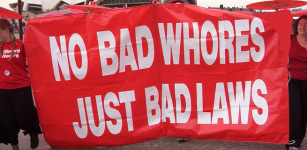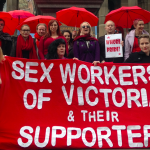Decriminalise the Sex Work Industry Now

The second Law and Sex Worker Health (LASH) report was released last Friday. And the study demonstrated overwhelmingly that the criminalisation of the sex work industry continues to negatively impact the health, safety and well-being of sex workers.
The initial 2007 LASH report focused upon three Australian jurisdictions and the different approaches each takes to sex work: the NSW decriminalisation model, the implementation of the licensing scheme for commercial sex in Victoria, and criminalisation in Western Australia.
For the current Curtin University LASH report, researchers took a look at how the Western Australian industry has changed over the last decade. There was a specific focus upon the intersection of law enforcement and the health and safety of sex workers, as well as the implications of this nationwide.
A detrimental approach
In Western Australia, the Criminal Code 1913 and the Prostitution Act 2000 govern the state’s sex work laws. And while the act of sex work itself is not an offence, most sex work-related activities are outlawed.
Julie Bates, principal at Urban Realists Planning and Health Consultants, was one of the LASH researchers. She explained that being a sex worker in WA – as well as in the rest of the country – is not illegal, but it’s “all the other parts around it that are criminalised.”
“Working in a brothel in Western Australia is technically illegal,” Ms Bates said. “The police can come in at any moment and arrest you for providing a sexual service in a massage parlour.” She further explained that an establishment “can’t openly be a brothel, because it’s illegal.”
And as the report found the criminalisation of the industry “is being used as an excuse for abuse” by clients. “If the state doesn’t give a damn about you, and has chosen to criminalise your industry, why would some clients want to behave any better towards you?” Ms Bates asked.
A lack of trust in police
A prohibitive approach also leads to a reluctance amongst sex workers to engage with police services if they’re a victim of a crime. “It’s a shocking state of affairs,” Ms Bates told Sydney Criminal Lawyers®. “We should be able to call upon police to protect us, but we can’t when the industry is criminalised.”
Researchers found that 49 percent of the 354 sex workers surveyed said they felt uncomfortable or very uncomfortable about reporting sexual assault, threats and other crimes against them to police. And this is a higher proportion than the previous LASH report found a decade earlier.
One fifth of those surveyed reported having been assaulted at least once over the last twelve months. This too is a higher number than a decade ago. And the number of sex workers that reported being threatened by clients has also increased.
The report highlights “the need to work with police to ensure sex workers are willing to report crimes against them,” which would reduce the physical risks they face.
However, it was also found amongst respondents that the most commonly reported incidents of discrimination were with police, “with 27 percent reporting experiences of negative treatment, stigma or discrimination from police officers at least once.”
The harms associated
The report notes that although sexually transmissible infection (STI) and HIV prevention amongst sex workers has been highly successful in Australia, those working in the industry remain a priority population for potential transmission, due to the occupational risks.
Under a prohibition model, heavy policing can lead to an elevated risk of STI and HIV contraction, as sex workers are forced to engage in riskier practices to avoid arrest. The WA criminalisation approach also leads to barriers to accessing health services, due to the underground nature of the work.
A changing industry
The current LASH report has a broader scope than the original, as along with female brothel-based workers, it included the experiences of private and escort workers, as well as male and transgender sex workers.
Researchers found that the industry has changed over the last decade, with a decrease in brothel and street-based sex work and an increase in private sex workers. The internet and social media have had a significant impact upon the way sex work services are promoted.
And contrary to popular belief, more surveyed sex workers than not – 40 percent – reported that sex work enhanced their well-being. This included increased self-confidence, financial benefits and work flexibility. While only a fifth reported that it hindered their well-being.
Ending prohibition
The key recommendation of the report is that Western Australia decriminalises the sex work industry. Decriminalisation in NSW has been recognised around the world as a best practice model, and it was highly influential in the approach New Zealand took to decriminalisation.
In 1995, the Disorderly Houses Development Act passed through NSW state parliament, effectively decriminalising most aspects of the sex work industry. The reforms reduced police corruption, improved sex worker health and safety, and increased access to peer support and education.
The ACT passed legislation in 1992 that decriminalised much of its sex work industry. And in July this year, a sex work decriminalisation bill was passed in the South Australian upper house. If passed through the lower house, it will establish the most completely decriminalised industry in the world.
A legitimate industry
According to Ms Bates, it’s important that sex work “be seen as legitimate and valued work and that it is not something from which sex workers need to be rescued or rehabilitated as the end demand abolitionist and faith-based movement would have you believe.”
The Swedish model is an end demand approach that criminalises those who pay for the services of sex workers, but not the workers themselves. This model has been condemned by sex worker rights advocates globally, as it actually maximises harm to sex workers and their families.
However, moves to decriminalise the industry are happening around the world. Amnesty International has adopted a policy calling for decriminalisation to protect the human rights of sex workers.
While in California there’s a case before a federal appeals court to legalise that state’s industry.
Entrenched attitudes
For many in the industry, the stigma that surrounds it is a highly damaging aspect of sex work. Maxine Doogan president of the Erotic Service Provider Legal, Educational and Research Project – a group behind the California case – has described being associated with sex work as akin to “social death”.
“The hidden nature of sex work, where you have to hide what you do to avoid the stigma and discrimination, is harmful,” Ms Bates concluded. “Decriminalisation does chip away at the stigma, and we need more of it.”







